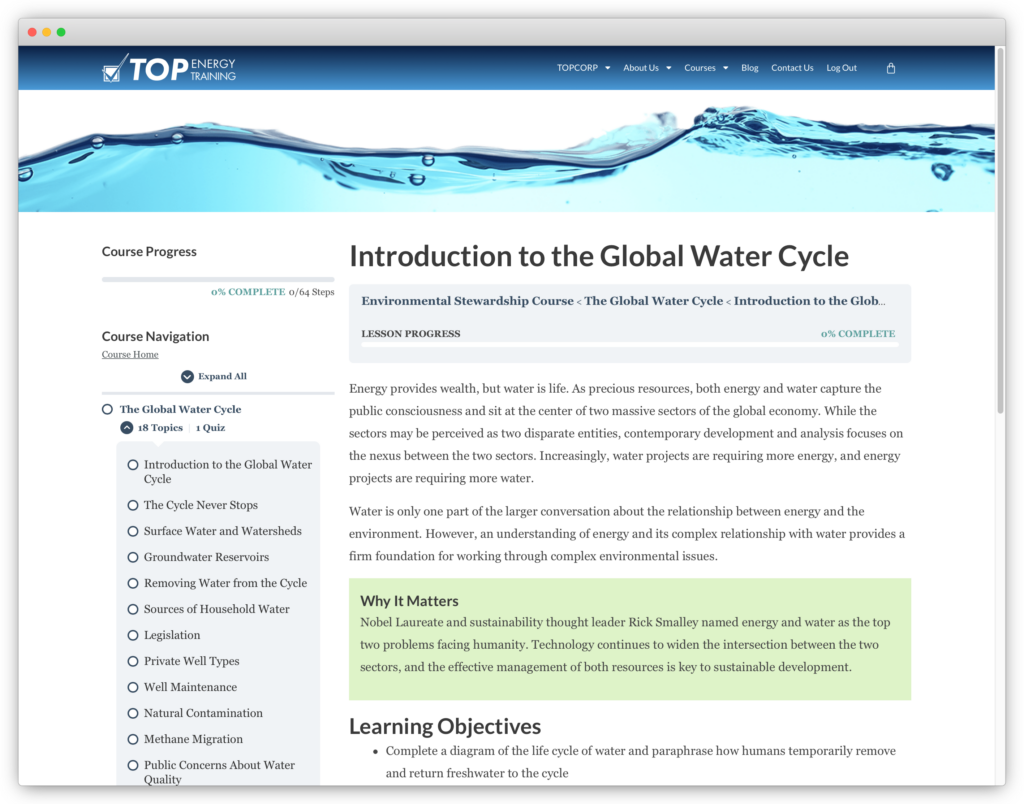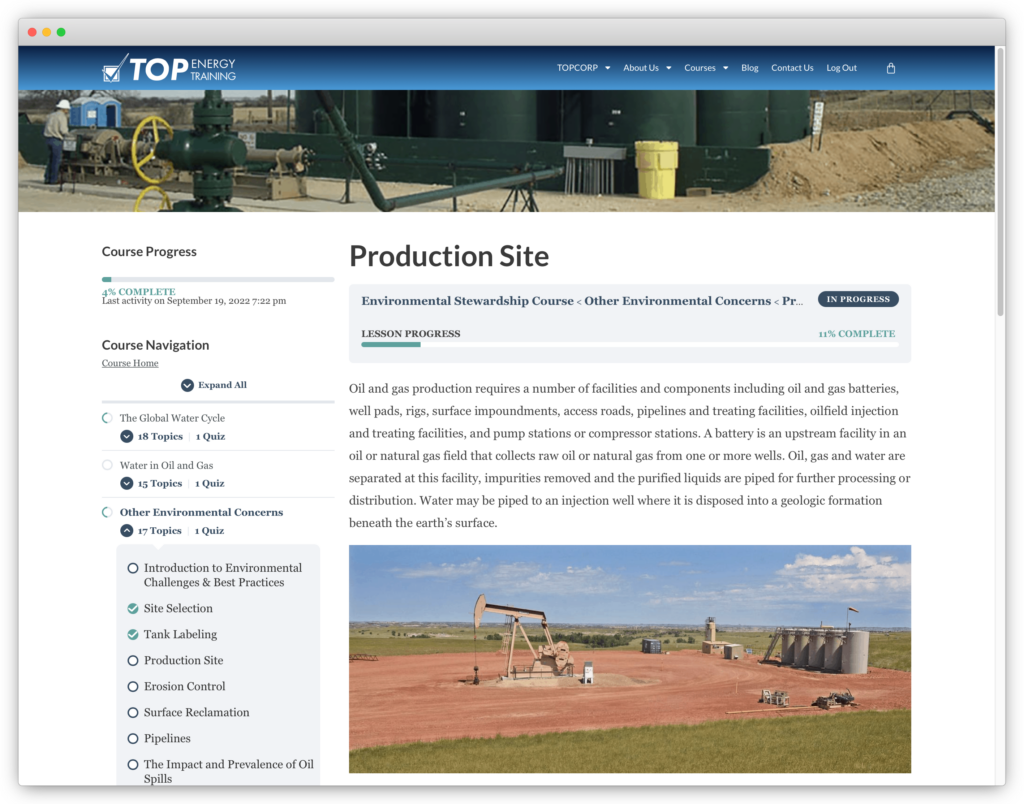Environmental Stewardship: Full Course
5 Lessons • 66 Topics
Do you have business interests in the oil and natural gas industry? Maybe you’re looking to pursue a career in the industry? If so, you could benefit from TOP Energy Training’s online oil and gas training courses. We’ve designed our courses to educate students and industry professionals on the latest technology innovations, and we review our training courses regularly to stay up-to-date with the industry. In our Environmental Stewardship Course, we cover the intersection between the oil and gas industry and the wider environment.
Not sure you want to invest in an entire course? Certain popular lessons are available for individual purchase. Take one of the course lessons to try it out. Your lesson cost can later be applied to the purchase of the full course if you like.
Environmental Stewardship Course Content Overview
The Environmental Stewardship Course starts with an overview of the global water cycle and the energy-water nexus before closely examining other environmental concerns. The course ends with an overview of sustainable development as a best practice in the oil and gas industry. Each lesson is divided into multiple topics to broaden your knowledge and provide you with technical depth. Our instructors include faculty members at numerous universities and professionals with a range of technical, regulatory and policy backgrounds.
This … training, I would definitely recommend to any new colleagues coming into the oil and gas department, particularly our people who work in compliance, our water quality specialists, and our oil and gas inspectors.
—Susan Kuhns, Pennsylvania Dept of Environmental Protection


Lessons from the course
Created in conjunction with TOP Energy Training’s highly qualified instructors, each lesson encompasses multiple topics to sharpen your knowledge and technical proficiency.

The Global Water Cycle
18 Topics
The Global Water Cycle lesson covers a wide range of topics such as, surface water and watersheds, groundwater reservoirs, sources of household water, private wells, well maintenance, natural contamination, methane migration, water sampling, water testing and baselines, water quality, and trends in water consumption. This lesson provides a thorough understanding of the relationship between energy and water within the context of complex environmental issues.

Water in Oil and Gas
15 Topics
Following the introductory material in the Global Water Cycle lesson, the Water in Oil and Gas lesson provides a more in-depth analysis of the different ways that water use and management impacts the oil and gas industry. The lesson covers use of water in various sectors, water jurisdictions and water rights, trends in water consumption, factors and obstacles related to sourcing water for oil and gas operations, natural events that affect oil and gas operations, use / treatment / recycling / disposal of water in oil and gas operations, and the role of water in recent unconventional plays.

Environmental and Regulatory Considerations
17 Topics
Through their lifecycle, oil and gas operations intersect the entire ecosystem including water, soil, air and the human environment. Leveraging best management practices at every phase helps keep operations profitable and sustainable while mitigating damage to the natural environment that may negatively impact operations in the future. This lesson focuses on non-water environmental factors including best management practices for construction of production sites and pipelines, surface reclamation, the impact and regulation of oil spills, solids disposal and monitoring, fugitive emissions and gas flaring, soil and air impacts, and the potential risks of naturally occurring radioactive material.

Health, Safety, Security, and Environmental and Social Responsibility
9 Topics
Many factors determine the success of a project in the energy industry. Technologies and resources are certainly critical, but there are five factors that form the main ingredients for a social license to operate: health, safety, security, environment and social responsibility. These factors ensure a positive relationship between companies, the people working on the project, and the broader community of stakeholders. This final lesson of the Environmental Stewardship course includes subject matter such as personal protective equipment, dermal absorption, hazardous additives, environmental regulation and legislation, hydrogen sulfide, first aid in the field, safety as a priority, and social license to operate.
Midstream Operations
7 Topics
Midstream operations in oil and gas industry is responsible for transporting production fluids from the production site (wellhead) to downstream refinery or plants, processing different components into marketable product(s) or environmentally acceptable substance(s) for disposal, storing, and marketing. This lesson discusses different surface facilities, such as separators, oil and gas processing facilities, pipeline transportation, multiphase flow in pipes, and some flow assurance issues.
Each lesson has a self-assessment at the end to reinforce the information and prepare you for the next lesson.
Who Should Take This Course?
Professionals working in a variety of energy-related careers (e.g., engineers, geoscientists, attorneys, accountants, managers, regulatory personnel, policymakers) know how important it is to stay current and up-to-date with the latest technology and advancements in the oil and gas sector. Students have a critical need to gain a solid foundation of industry fundamentals and distinguish their future college and/or employment applications. Educators want to present a broad perspective of the technical solutions within the oil and gas industry to their students, highlighting the diverse nature of careers and opportunities within the energy sector.

